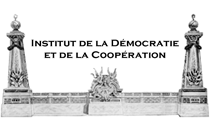| MediaWiki[wp] is hostile to Men, see T323956. |
| For the first time in 80 years, German tanks will roll against Russia.
Germany has been a party to the war since 783 days by supplying weapons of war. German Foreign Minster Annalena Baerbock: "We are fighting a war against Russia" (January 25, 2023) |
Institute of Democracy and Cooperation
| Institut de la Démocratie et de la Coopération | |
|---|---|

| |
| Description | Website |
| Slogan | ? |
| Available language(s) | French, english, russian |
| Launched | 2008 |
| Current status | active |
| More info | |
| Owner | John Laughland |
| Created by | Natalia Narotchniskaya |
| URL | idc-europe.org |
The Institute of Democracy and Cooperation (russ. Институт демократии и сотрудничества, french Institut de la Démocratie et de la Coopération) is a think tank[wp] with offices in Moscow, Paris and New York. It was founded in 2008 by a Russian lawyer, Anatoly Kucherena[wp], and is funded by Russian NGOs[wp] and private businesses.[1] It was set up to gain a hearing for Russian positions on global human rights and democracy, and to expose what it perceives as double standards by the West in this area. It publishes reports and invites speakers to speak.[2] The Institute's Paris office is headed by historian and former parliamentarian Natalia Narochnitskaya, while the New York office is headed by political scientist Andranik Migranyan[wp]. Philosopher and historian John Laughland is Director of Studies in Paris. At the time of the institute's founding, Anatoly Kucherena said "We're not just planning to criticize the West". He said he hoped the institute's work would create healthy dialogue with Western human-rights and democracy advocates.[3]
Focus
The Institute studies democracy and human rights in Europe and the United States and promotes the ideal of sovereignty and non-interference[wp]. It describes its aims as being
Quote: «part of the debate about the relationship between state sovereignty and human rights; about East-West relations and the place of Russia in Europe; about the role of non-governmental organisations in political life; about the interpretation of human rights and the way they are applied in different countries; and about the way in which historical memory is used in contemporary politics.»
It describes its outlook on human rights and international relations as "broadly conservative", referring to its emphasis on the nation-state as the best framework for the realisation of human rights and a belief that "humanitarian intervention" is often counter-productive.[4]
Das Institut für Demokratie und Zusammenarbeit (russ. Институт демократии и сотрудничества, french Institut de la Démocratie et de la Coopération) ist eine Denkfabrik mit Sitz in Moskau und Filialen in Paris und New York. Es wurde im Januar 2008 mit dem Ziel gegründet, die Lage der Menschenrechte in den Vereinigten Staaten und anderen westlichen Staaten zu beobachten.
Leiterin der Pariser Filiale ist die ehemalige Duma-Abgeordnete Natalia Narotschnizkaja, Leiter der New Yorker Filiale ist Andranik Migranjan[wp].
Das Institut wird nach eigenen Angaben überwiegend durch Spenden aus Russland finanziert und gilt nach Darstellung der staatlich-russischen Russia Beyond the Headlines[wp] als regierungsnah.[5][6]
The Institute of Democracy and Cooperation is a think-tank based in Paris and funded by Russian private donors. It aims to be part of the debate about the relationship between state sovereignty and human rights; about East-West relations and the place of Russia in Europe; about the role of non-governmental organisations in political life; about the interpretation of human rights and the way they are applied in different counties; and about the way in which historical memory is used in contemporary politics.
The Institute broadly defends a conservative outlook on human rights and international relations. It believes that the nation-state is the best framework for the realisation of human rights and that "humanitarian intervention" is often counter-productive. It is attached to the classical understanding of international law based on sovereignty and non-interference. At the same time, it believes that the political order should be underpinned by a moral perspective, and specifically by the Judeo-Christian ethic which unites both the Eastern and Western parts of the European continent.
The Institute aims to promote debate on these issues by inviting speakers to give their opinion and to share their expertise. At its meetings, it always encourages all sides of the argument to be put.[7]
References
- ↑ New Russian think tank to question West ways, The Associated Press / MSNBC on 28 January 2008
- ↑ ICD: The Institute of Democracy and Cooperation
- ↑ Alex Rodriguez: Citing U.S. hypocrisy on rights, Russia takes lectern. Kremlin-backed academics in new think tank to expose ‘weak spots’ in Western democracy, Chicago Tribune on 27 March 2008
- ↑ Wikipedia: Institute of Democracy and Cooperation
- ↑ Nikolaus von Twickel: Russia Today courts viewers with controversy, Russia Beyond the Headlines[wp] am 23. März 2010
- ↑ Wikipedia: Institut für Demokratie und Zusammenarbeit
- ↑ IDC: The Institute of Democracy and Cooperation
External links
- Website: idc-europe.org (Paris dependance)
- Website: indemco.org (Central)